Etiological or Causal Factors in TCM TCM holds that there are both opposite and unitary relationships between the organs and the tissues, and between the human body and the natural environment. These things maintain a relative dynamic balance through a process in which contradiction alternately appears and disappears. When this dynamic balance is broken for whatever reason and cannot immediately be restored through self-regulation, certain diseases will occur.
| The five elements and their relationships with the body's organs |
|
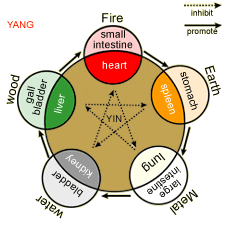 |
The pathogenic influences that alter the state of relative balance in the body and lead to disease are called etiological or causal factors.
Modern Western medical science attempts to isolate purely physical factors as the cause of disease. Bacteria and viruses, chemical compounds, and other external factors are blamed for most illnesses. The Chinese, however, view many of these "causes" merely as symptoms of the disease; because a certain organ is weak and unable to resist outside invasion, it is therefore prone to attack by an outside agent. Killing the agent eliminates the immediate symptoms of the disease but does nothing to restore the original qi (vital energy) of the diseased organ and tissues. It is only a matter of time before it succumbs to another attack.
TCM, however, attributes the cause of most diseases to external cosmological and internal emotional factors. These factors conform and act according to the principles of yin-yang and the five elements, which both stress balance and interconnectedness.
The external cosmological causes of disease are called the "Six Evils" and are governed by the meteorological conditions of season and climate while the internal emotional factors are called the "Seven Emotions" which are affected by our emotional response to different situations. The Huang Ti Nei Ching (The Yellow Emperor's Medicine Classic) states: "The pathogenic evils either originate in yin or originate in yang; those coming from yang are related to wind, rain, cold, and summer heat; Those coming from yin are related to food and drink, living places, sexual life, and emotions such as joy and anger."Table 1 The five elements and their relationships with nature and the body | Wood | Fire | Earth | Metal | Water |
| Orientation | East | South | Middle | West | North |
| Season | Spring | Summer | Late Summer | Autumn | Winter |
| Climate | Wind | Summer Heat | Dampness | Dryness | Cold |
| Cultivation | Germinate | Grow | Transform | Reap | Store |
| Yin Organ | Liver | Heart | Spleen | Lung | Kidney |
| Yang Organ | Gall Bladder | Small Intestine | Stomach | Large Intestine | Bladder |
| Orifice | Eye | Tongue | Mouth | Nose | Ear |
| Tissues | Tendons | Vessels | Muscles | Skin & Hair | Bones |
| Emotions | Anger | Joy | Pensiveness | Grief | Fear |
| Colour | Blue/ Green | Red | Yellow | White | Black |
| Taste | Sour | Bitter | Sweet | Pungent | Salty |
| Voice | Shout | Laugh | Sing | Cry | Groan |
What Are The Six Evils ? | The six climatic evils are: |
|
| 1. Wind 2. Cold 3.Summer Heat 4. Dampness 5. Dryness 6. Fire |
They have the following pathogenic features: | The pathogenic features of the six TCM evils. |
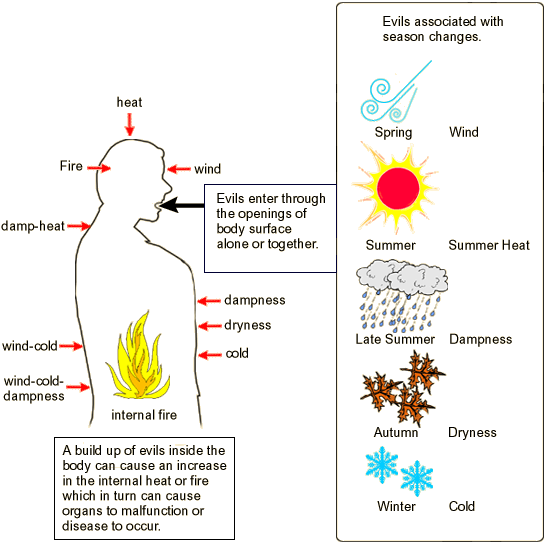 |
| They are related to the seasons or working environment
For example, generally there are wind diseases in spring, summer-heat diseases in summer, damp diseases in late summer and early autumn, dry diseases in autumn, and cold diseases in winter. In addition, people who live for a long time in a damp environment tend to be easily attacked by the damp evil, and those who work long in an environment of high temperature tend to be easily attacked by the dry-heat evil or fire evil. |
| All evils can work alone or in combination of two more in attacking the body
Such syndromes like the common cold of wind-cold type, damp-heat diarrhoea, and wind-cold-damp blockage are examples of medical problems caused by a combination of evils. |
| In the course of causing disease, any one of the six evils can influence the others and can also transform into another kind of evil under certain conditions.
For example, the cold evil that enters the body's interior can be transformed into the heat evil, and the long-persisting summer-heat with dampness can be transformed into dryness evil. |
| The six climatic evils enter the body and cause disease mostly through the spaces located between skin and muscle, or the openings like nose and mouth. For this reason they are also termed the "six exogenous or outside evils". |
| Evil | Element | Season | | Wind | Wood | Spring | | Cold | Water | Winter | | Summer-heat | Fire | Summer | | Dampness | Earth | Late Summer | | Dryness | Metal | Autumn |
|
Special Conditions
The Six Evils do not affect every person in the same way. Indeed, exceptionally healthy persons are not adversely affected by any of them. An "evil-excess" will attack the body only when and where it is weak and only when the protective-qi is deficient somewhere along the surface of the body. One of the purposes of preventive medicine is to keep the body resistant to such outside attacks. Diseases of the six evils are most likely to occur under abnormal weather conditions, when the body is prepared for the dominant season and suddenly faces an opposite force. Sudden cold spells in mid-summer, for example often causes epidemics of influenza. Similarly, people who travel or move from a cold, dry place to a warm, damp climate are more vulnerable to invasion by local meteorological excesses than natives of the region.
Plague was a major problem during ancient time; therefore TCM learnt about epidemic diseases earlier and pestilential evils are blamed for it. The pestilential evil is a kind of pathogenic factor with intense infectivity. Attacks of pestilential evils are usually related to unusual climates such as droughts, floods, extreme heat as well as pollution. Epidemics occur suddenly with severe symptoms and are highly contagious.
What Are The Seven Emotions?
Suwen (The Book of Plain Questions) says "The five yin-organs of the human body produce five kinds of essential qi, which bring forth joy, anger, grief, worry, and fear." TCM also believes that certain organs are related to emotional activities, i.e. the heart is related to joy, the liver to anger, the spleen to pensiveness, the lungs to anxiety and the kidneys to fear.
The emotions are considered the major internal causes of disease in TCM. Emotional activity is seen as a normal, internal, physiological response to stimuli from the external environment. Within normal limits, emotions cause no disease or weakness in the body. However, when emotions become so powerful that they become uncontrollable and overwhelm or possess a person, then they can cause serious injury to the internal organs and open the door to disease. It is not the intensity as much as the prolonged duration or an extreme emotion, which causes damage. While Western physicians tend to stress the psychological aspects of psychosomatic ailments, the pathological damage to the internal organs is very real indeed and is of primary concern of the TCM practitioner.
Excess emotional activity causes severe yin-yang energy imbalances, wild aberrations in the flow of blood, qi (vital energy) blockages in the meridians and impairment of vital organ functions. Once physical damage has begun, it is insufficient to eliminate the offending emotion to affect a cure; the prolonged emotional stress will require physical action as well. The emotions represent different human reactions to certain stimuli and do not cause disease under normal conditions.
The Pathogenic Features of the Seven Emotions:
| | Directly impairing organ qi (vital energy) |
| | Affecting the functions of organ qi (vital energy) |
| | Deteriorating effects of emotional instability |
| The seven emotions in TCM are: |
|
| 1. Joy 2. Anger 3. Anxiety 4. Pensiveness 5. Grief 6. Fear 7. Fright |
喜 Joy 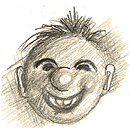 |
| In TCM joy refers to a state of agitation or overexcitement. |
"When one is excessively joyful, the spirit scatters and can no longer be stored," states the Lingshu (The Vital Axis). However, in TCM, joy refers to a states of agitation or overexcitement, rather than the more passive notion of deep contentment. The organ most affected is the heart. Over-stimulation can lead to problems of heart fire connected with such symptoms as feelings of agitation, insomnia and palpitations. 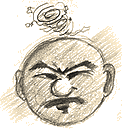 |
| Anger could lead to high blood pressure. |
怒 Anger
Anger, as described by TCM, covers the full range of associated emotions including resentment, irritability, and frustration. An excess of rich blood makes one prone to anger. Anger will thus affect the liver, resulting in stagnation of liver qi (vital energy). This can lead to liver energy rising to the head, resulting in headaches, dizziness, and other symptoms. In the long run it can result in high blood pressure and can cause problems with the stomach and the spleen. It is commonly observed that ruddy, "full-blooded" people with flushed faces are more prone than others to sudden fits of rage at the slightest provocation. 憂 Anxiety 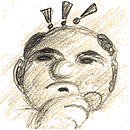 |
| Anxiety can block the qi and manifest in rapid, shallow breathing. |
"When one feels anxiety, the qi (vital energy) is blocked and does not move." Anxiety injures the lungs, which control qi (vital energy) through breathing. Common symptoms of extreme anxiety are retention of breath, shallow, and irregular breathing. The shortage of breath experienced during periods of anxiety is common to everyone. Anxiety also injures the lungs' coupled organ, the large intestine. For example, over-anxious people are prone to ulcerative colitis. 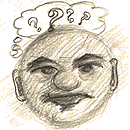 |
| Too much intellectual stimulation can cause pensiveness. |
思 Pensiveness
In TCM, pensiveness or concentration is considered to be the result of thinking too much or excessive mental and intellectual stimulation. Any activity that involves a lot of mental effort will run the risk of causing disharmony. The organ most directly at risk is the spleen. This can lead to a deficiency of spleen qi (vital energy), in turn causing worry and resulting in fatigue, lethargy, and inability to concentrate. 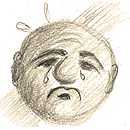 |
| Grief that remains unresolved can create disharmony in the lungs. |
悲 Grief
The lungs are more directly involved with this emotion. A normal and healthy expression of grief can be expressed as sobbing that originates in the depths of the lungs - deep breathes and the expulsion of air with the sob. However, grief that remains unresolved and becomes chronic can create disharmony in the lungs, weakening the lung qi (vital energy). This in turn can interfere with the lung's function of circulating qi (vital energy) around the body.恐 Fear
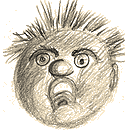 |
| Fear that cannot be directly addressed is likely to lead to disharmony in the kidneys. |
Fear is a normal and adaptive human emotion. But when it becomes chronic and when the perceived cause of the fear cannot be directly addressed, then this is likely to lead to disharmony. The organs most at risk are the kidneys. In cases of extreme fright, the kidney's ability to hold qi (vital energy) may be impaired leading to involuntary urination. This can be a particular problem with children.
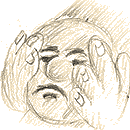 |
| Fright can affect the kidneys if left unchecked. |
驚 Fright
Fright is another emotion not specifically related to only one organ. It is distinguished from fear by its sudden, unexpected nature. Fright primarily affects the heart, especially in the initial stages, but if it persists for some time, it becomes conscious fear and moves to the kidneys.
| Table 3. Excess of Certain Emotions Affects a Particular Yang-organs |
| Joy | Heart | | Fear (Fright) | Kidney | | Grief (Anxiety) | Lungs | | Pensiveness | Spleen | | Anger | Liver |
|
Constitutional and Lifestyle Factors
While the main causes of body disharmony are external like the six evils or internal like the seven emotions, there are additional factors that need to be taken into consideration in disease causation. These factors are constitutional factors, lifestyle factor and unforeseen factors.Constitutional Factors
TCM maintains that an individual's energy system are comprised of inborn qi and jing produced throughout life. Inborn qi represents our constitution, which depends on our parents. If inborn qi is deficient, the individual is more susceptible to the whole range of external and internal factors, which can possibly cause a disharmony. Therefore, if we believe that we have any constitutional weakness, we need to take particular care to ensure that any other potential causes of disharmony in our lives are avoided if at all possible. Lifestyle Factors
TCM has always recognized the importance of "lifestyle factors" in the maintenance of good health and well being. This now has become the focus of Western medicine.
| Work |
|  | | Too much physical work can impair the qi. |
The kind of work we do, or lack of it if unemployed, can profoundly influence our energy system. Too much physical work can impair the qi (vital energy), and with excessive lifting the lungs become deficient. Too much mental activity can damage the spleen and make the yin deficient. Someone who works outdoors, for example, is more liable to be at risk from cold, dampness, wind or heat evils. |
| |
| Exercise |
| 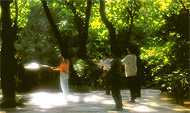 | | Exercise is good for us in the right amounts. |
Exercise, if undertaken to an extreme can cause disharmony. For example, many athletes, who train to an excessive degree, appear very fit, but are often very susceptible to infections and injuries. In the long run they may become chronically qi (vital energy) deficient because of overstressing the kidneys. It will be noted that many Chinese exercise regimes such as qi-gong or taijichuan are not obviously aerobic in nature like many Western forms of exercise. These practices however, offer a more balanced approach to exercise consistent with the principles of TCM. It is evident that good health and longevity are notable in the practitioners of such activities. |
| |
| Diet |
| 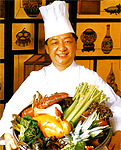 | | Diet is a common factor in disease development. |
Diet is afforded a very important place in Chinese medicine. See Chinese Functional Foods. The stomach and spleen have the responsibility for processing food and extracting the nutrient essence, which is then passed onto the lungs as a central part of the production of qi (vital energy) in the body. If the spleen has to work against poor and damaging foods, then it will suffer (especially from damp) and the body will deplete the qi (vital energy) of the body as a whole.
Balance rather than specific dietary instructions represents the Chinese approach to nutrition. If an individual follows a healthy and balanced diet, then the spleen will remain healthy and the qi (vital energy) of the body will be sufficient. The overemphasis on sweet and processed foods in many Western diets does not lend itself to such a balance. |
| |
| Sexual Activity |
| In TCM, excessive sexual activity is considered to be damaging to kidney jing and can lead to long-term deficiency problems. An excessive number of pregnancies can seriously deplete a woman's blood and jing. While there is much debate about what is considered excessive sexual activity, the Chinese system generally emphasizes a natural decline in this activity as part of the ageing process. |



















No comments:
Post a Comment